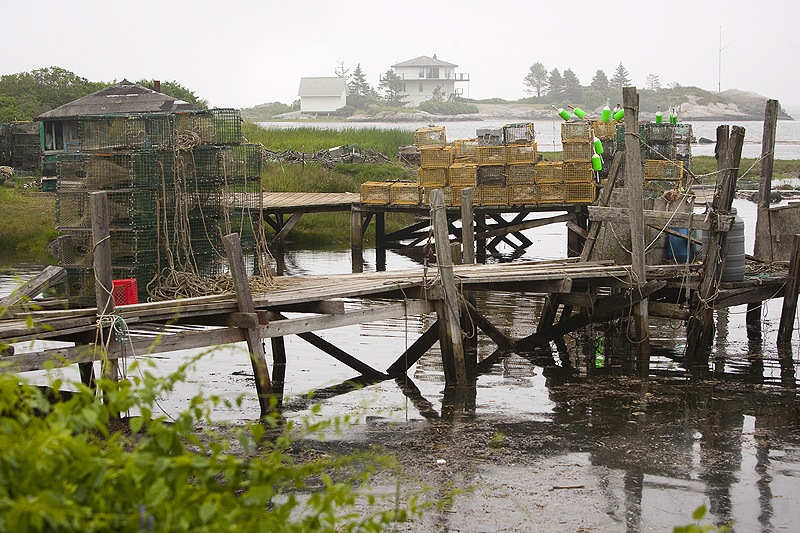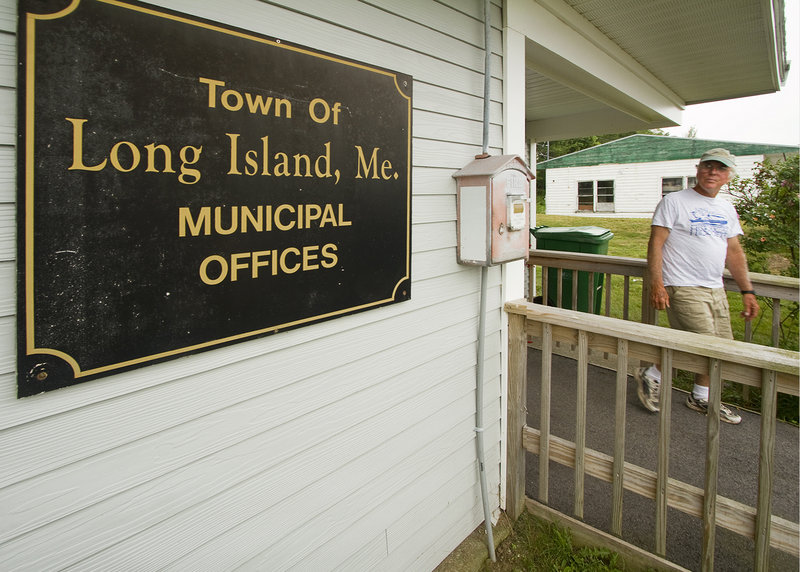LONG ISLAND – In many ways, little has changed here. This small island town has the same cast of characters it always has. Its small school still educates a handful of kids each year. There are still two stores, one gas pump and yards decorated with lobster buoys and traps.
But now there’s a small town hall, a new library and committees that meet to oversee everything from the cemetery to the supply of year-round housing for young working families. And in winter there are community suppers and school events that bring out most of the 205 year-round residents.
On Sunday, islanders celebrated the town of Long Island’s 20th birthday with a community party. It was on July 1, 1993, that Long Island officially seceded from Portland to become Maine’s 490th town.
“We’re the little town that could, and we have,” said Michael Kilgore, a longtime islander who has served on the school board.
Long Island — 4 miles long, a mile wide and a 45-minute ferry ride from the mainland — has been home to generations of the same families, many making a living on the water. The population more than quadruples in the summer.
Life is simple and happy on the island, according to residents, and has been especially so since Long Island became a town. Twenty-two years ago, on the other hand, islanders were embroiled in a tense standoff with Portland after a property revaluation doubled and, in some cases, tripled property taxes.
Fearing that working islanders would be priced out of their homes and the island would become an enclave for wealthy summer tourists, longtime resident Mark Greene started talking openly about secession. Islanders felt ignored by the city and were tired of constantly fighting for basic services, he said.
“We had no infrastructure, no public buildings, no nothing but taxes,” said Greene, a retired teacher whose family has been on the island since the 1880s. “This idea of becoming a town, people had no concept it could be done. We’d been part of Portland forever.”
When Greene mentioned secession to longtime resident Nancy Jordan, she told him he was crazy. She worried about the school, which Portland had threatened to close several times. But then, Jordan said, she realized the community would be better off if it could make its own decisions about the school and how to run the community.
Islanders rallied around the secession push, traveling to Augusta to petition the Legislature and finally, in November 1992, voting to leave Portland. The vote was 129-44.
There was no promise that taxes would go down, Greene said, but islanders were ready to take a leap of faith.
The divorce agreement between the city and town — hammered out in binding arbitration sessions that Greene said were brutal — required Long Island to pay Portland more than $1 million. In return, the town got $600,000 of property that had been owned by the city.
Despite the debt to Portland, Long Island was able to fix crumbling roads, acquire and open a town hall and community center, and buy a high-speed rescue boat. A handful of years later, a state-of-the-art library was added to the Long Island School. The town just bought its first school bus, although there are no street signs here because “it just seems too civilized,” Greene said.
“Those are all things that wouldn’t be possible if we weren’t a town,” he said.
Even with all the upgrades to the community, taxes haven’t skyrocketed. The anticipated property tax rate for the 2014 fiscal year is $6.993 per $1,000 of assessed valuation. The projected property tax rate in Portland is $19.41 per $1,000 of valuation.
“We’ve really got it good now. We’re so much better off than we were,” said Jordan, the town treasurer. “The average tax bill is a third of what it would have been with the city, plus the services are better now.”
Jordan said the island elementary school, with two teachers and 22 students, is stronger than ever, with special classes and activities, such as a fiddle club led by musicians from the island and mainland. After fifth grade, students travel to Portland for school, taking the ferry daily alongside the 30 or so residents who commute to the mainland for work. The recreation department keeps children busy through the summer with Bollywood dancing, an archaeology camp and sailing classes.
Since secession, Long Island has had to take on all the responsibilities of a town, Greene said. That includes enforcing local ordinances and tackling tough budget decisions, like whether to invest in a school bus to replace the van that previously shuttled students to school in shifts. A committee currently is looking at how to provide affordable housing for young families who want to live on the island year-round.
“It used to be a lot of the year-round kids couldn’t wait to get out of here, but that isn’t the case anymore,” Greene said. “There is work here, but no housing. That’s a tough nut to crack.”
Over time, the relationship between Portland and the island has improved and there no longer seems to be any resentment about the secession, Greene said.
Islanders also have managed to get along with each other while running their own town.
Islanders have always been close, but they’ve become even more united in the past two decades, said resident Lorinda Vallas. There may be heated debates at the annual town meeting, but “at the end of the day, we agree to disagree” and everyone walks out friends, she said.
Vallas, 54, does a little bit of everything on the island. She delivers newspapers and packages, looks after dogs and helps out at one of the two stores on the island. She came here for the first time in a bassinet when she was 2 months old.
“It’s the island of misfit toys,” she joked as she tended the gas pump last week. She greeted every resident by name as they lined up in old cars, mopeds and golf carts to buy gas for $4.79 a gallon.
Steve Johnson, a lifelong islander known for racing lobster boats and transforming sports cars into boats, supported secession from the beginning because of the high taxes. Twenty years later, he’s glad the town fought for its independence.
“It’s pretty much stayed the same,” he said, “the way we want it.”
Gillian Graham can be contacted at 791-6315 or at:
ggraham@mainetoday.com
Twitter: grahamgillian
Send questions/comments to the editors.







Success. Please wait for the page to reload. If the page does not reload within 5 seconds, please refresh the page.
Enter your email and password to access comments.
Hi, to comment on stories you must . This profile is in addition to your subscription and website login.
Already have a commenting profile? .
Invalid username/password.
Please check your email to confirm and complete your registration.
Only subscribers are eligible to post comments. Please subscribe or login first for digital access. Here’s why.
Use the form below to reset your password. When you've submitted your account email, we will send an email with a reset code.